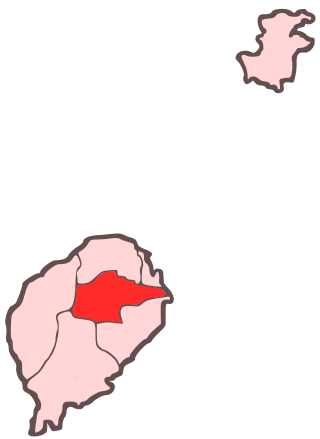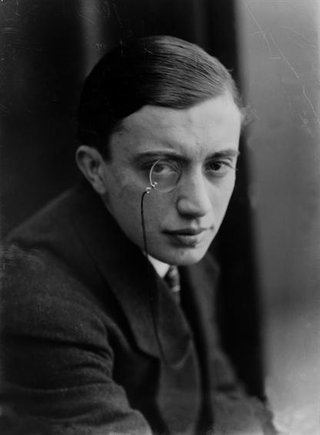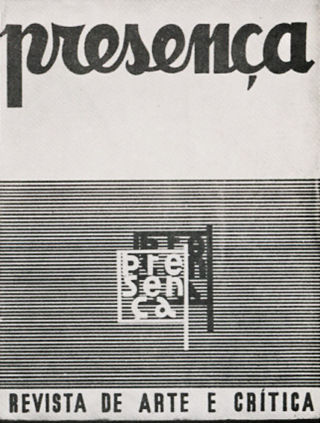
Mé-Zóchi is a district of São Tomé and Príncipe, on São Tomé Island. Its area is 122 km2 (47 sq mi). With 44,752 residents (2012) rising to 50,800 in 2018, it is the second most populous district of the country. The district seat is Trindade. It is divided into the five statistical subdistricts Trindade, Madalena, Caixão Grande, Bombom and Almas.
Ferraz is a surname. Notable people with the surname include:
Soares is a common surname in the Portuguese language and Galician, namely in the Portuguese speaking world, as well as other places. It was originally a patronymic, meaning Son of Soeiro. It is equivalent to the Spanish surname Suárez. Notable people named Soares include:

José Sobral de Almada Negreiros was a Portuguese artist. He was born in the colony of Portuguese São Tomé and Príncipe, the son of a Portuguese father, António Lobo de Almada Negreiros, and a Santomean mother, Elvira Freire Sobral. Besides literature and painting, Almada developed ballet choreographies, and worked on tapestry, engraving, murals, caricature, mosaic, azulejo and stained glass.

Eduardo Afonso Viana was a Portuguese painter. He was one of the members of the first modern generation in Portuguese painting, like Amadeo de Souza Cardoso and Almada Negreiros. He was more conservative in his approach to modern painting. The best examples of his assimilation of the modern styles in his work appears in the paintings he did in 1916, due to the influence of both Robert Delaunay and Sonia Delaunay, who he befriended during their presence in Portugal. He latter followed the post-impressionist style inspired by Cézanne in some of his best paintings. He's represented in some of the best Portuguese museums, like Chiado Museum, in Lisbon, and the National Museum Soares dos Reis, in Porto.

Augusto César de Almeida de Vasconcelos Correia, GCSE, better known as Augusto de Vasconcelos was a Portuguese surgeon, politician and diplomat, who served as 57th Prime Minister of Portugal.

The Geração de Orpheu or Grupo de Orfeu were a Portuguese literary movement, largely responsible for the introduction of Modernism to the arts and letters of Portugal through their tri-monthly publication, Orpheu (magazine) (1915).

António Lobo de Almada Negreiros was an illustrious journalist and colonialist writer, essayist and poet.
Pedro de Almada Pereira, was an Alentejan landowner, schoolmaster in Messejana and Aljustrel and journalist, Founder of the periodical O Campo de Ourique, of which he was the owner, in 1872. He was a son of Tomé José Valério, who lived and was a landowner in Odemira, Vila Nova de Milfontes, and wife Maria Amância de Almada, who also used the name of Maria Amância Palma.
José António Freire Sobral, was a farmer and a large exporter of coffee, cocoa and woods who made his fortune in São Tomé Island in Portuguese São Tomé and Príncipe. He was the owner of the Roças Saudade and Santa Maria in the village of Trindade and was a Vocal of the Council of the Province of Portuguese São Tomé e Príncipe and Regedor of the village of Trindade. He was made Commander of the Order of Agricultural Merit of Portugal.

Lobo is a surname found in the Galician, Spanish and Portuguese languages meaning "wolf", and in other languages with other meanings. Notable people with the surname include:
Almada is a city and a municipality in Portugal.

Luís de Montalvor was a pseudonym of Portuguese poet and editor Luís Filipe de Saldanha da Gama da Silva Ramos.

Atlantida: mensário artístico, literário e social para Portugal e Brasil was a magazine published in Portugal and Brazil from 1915 to 1920. The magazine was headed by the poet João de Barros and the journalist and playwright João do Rio to foster the relationship between the two countries. These relationships between "sister nations" occupy a central theme of the magazine during World War I, here portrayed as "a suitable moment to create ties between the two states, based on race, traditions and common history, and the notion of Latinity." They also sought to emphasize connections between Portuguese and Brazilian cultures.
Sudoeste: cadernos de Almada Negreiros was a Portuguese review published in Lisbon in 1935. The magazine was an attempt to continue the Orpheu movement. It was headed by Almada Negreiros, in collaboration with Dário Martins, which put their knowledge in different forms of direct interventionism, contacts and its influences to the publication of the periodical.

Presença - Folha de Arte e Crítica was a Portuguese magazine published in Coimbra from 10 March 1927 until 1940, producing a total of 54 issues during its existence.

André Vidal de Negreiros was a Portuguese colonial governor and military man born in the then colony of Brazil, known mainly for being one of the leaders of the Insurrection of Pernambuco, also known as the War of Divine Light, against Dutch colonization in Brazil (1624–1654).
The Literature of São Tomé and Príncipe is one of the richest in Lusophone Africa. Most works are written in Portuguese, but there are also works in Forro Creole, and notably English as well as Caué Creole. Recently there are very few works written in Príncipense Creole (Lunguye).











